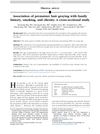 54 citations,
April 2019 in “Journal of cellular physiology”
54 citations,
April 2019 in “Journal of cellular physiology” miR-218-5p helps skin and hair growth by targeting SFRP2 and activating a specific signaling pathway.
 52 citations,
February 2018 in “Diabetology & Metabolic Syndrome”
52 citations,
February 2018 in “Diabetology & Metabolic Syndrome” Some skin conditions may indicate metabolic syndrome, which could help with early detection and management of related health issues.
 52 citations,
June 2009 in “Current Opinion in Endocrinology, Diabetes and Obesity”
52 citations,
June 2009 in “Current Opinion in Endocrinology, Diabetes and Obesity” The document concludes that hair transplantation and gene therapy may be important for future hair loss treatment.
 51 citations,
March 1987 in “Journal of The American Academy of Dermatology”
51 citations,
March 1987 in “Journal of The American Academy of Dermatology” Minoxidil keeps most hair growth from first year and twice-daily use is better with few side effects.
 51 citations,
November 2013 in “Drug Discovery Today”
51 citations,
November 2013 in “Drug Discovery Today” Small molecule drugs show promise for advancing regenerative medicine but still face development challenges.
 50 citations,
September 1975 in “American Heart Journal”
50 citations,
September 1975 in “American Heart Journal” Minoxidil effectively controls blood pressure in severe cases, but may cause fluid retention and edema.
 49 citations,
May 2013 in “JAMA Dermatology”
49 citations,
May 2013 in “JAMA Dermatology” Hair loss links to higher death risk from diabetes and heart disease; not a direct cause, but a marker for risk factors.
 49 citations,
September 2012 in “The Journal of clinical endocrinology and metabolism/Journal of clinical endocrinology & metabolism”
49 citations,
September 2012 in “The Journal of clinical endocrinology and metabolism/Journal of clinical endocrinology & metabolism” The document concludes with guidance for doctors on diagnosing and treating hirsutism effectively and safely.
 49 citations,
January 1980 in “Journal of Cardiovascular Pharmacology”
49 citations,
January 1980 in “Journal of Cardiovascular Pharmacology” Minoxidil doesn't increase pericardial disorder risk, but may cause fluid accumulation.
 48 citations,
June 2020 in “Current Rheumatology Reports”
48 citations,
June 2020 in “Current Rheumatology Reports” Different types of fibroblasts play various roles in both healthy and diseased tissues, and understanding them better could improve treatments for fibrotic diseases.
 48 citations,
October 2014 in “International Journal of Cardiology”
48 citations,
October 2014 in “International Journal of Cardiology” People with alopecia are at higher risk for heart disease and have more heart-related risk factors.
 48 citations,
January 2011 in “Circulation”
48 citations,
January 2011 in “Circulation” Cardiovascular disease deaths decreased but still caused one-third of U.S. deaths in 2007, with high rates of hypertension, smoking, obesity, and diabetes.
 48 citations,
July 2019 in “International Journal of Biological Macromolecules”
48 citations,
July 2019 in “International Journal of Biological Macromolecules” A new hydrogel with stem cells from human umbilical cords improves skin wound healing and reduces inflammation.
 47 citations,
May 2020 in “Cardiovascular Research”
47 citations,
May 2020 in “Cardiovascular Research” The document concludes that future heart disease research should account for sex-specific differences to improve diagnosis, treatment, and outcomes.
 47 citations,
February 2015 in “European Journal of Clinical Investigation”
47 citations,
February 2015 in “European Journal of Clinical Investigation” The review suggests thorough evaluation and genetic testing for proper diagnosis and treatment of Chrousos syndrome.
 47 citations,
July 2013 in “Pharmacological Reviews”
47 citations,
July 2013 in “Pharmacological Reviews” Regenerative pharmacology, which combines drugs with regenerative medicine, shows promise for repairing damaged body parts and needs more interdisciplinary research.
 47 citations,
November 2012 in “Wound repair and regeneration”
47 citations,
November 2012 in “Wound repair and regeneration” Nude mice with grafted human skin developed scars similar to human hypertrophic scars.
 46 citations,
December 2014 in “Journal of The American Academy of Dermatology”
46 citations,
December 2014 in “Journal of The American Academy of Dermatology” Premature hair graying in young men is linked to family history, obesity, and smoking.
 45 citations,
March 2015 in “Clinical Endocrinology”
45 citations,
March 2015 in “Clinical Endocrinology” Testosterone therapy is generally safe for transmen, improves sexual function, and has manageable health risks with proper monitoring.
 44 citations,
August 1996 in “Drugs & Aging”
44 citations,
August 1996 in “Drugs & Aging” Mitoxantrone is effective for treating acute leukemia, especially in older patients, with a lower risk of heart damage.
 44 citations,
July 1990 in “Journal of the American College of Cardiology”
44 citations,
July 1990 in “Journal of the American College of Cardiology” Captopril reduces heart mass, while minoxidil has opposite effects and side effects.
 43 citations,
July 2012 in “Molecular human reproduction”
43 citations,
July 2012 in “Molecular human reproduction” Certain metabolites are lower in women with PCOS and could be potential markers for the condition.
 42 citations,
November 2019 in “Frontiers in Endocrinology”
42 citations,
November 2019 in “Frontiers in Endocrinology” The document suggests creating a validated score to diagnose Cushing's Syndrome and considers plasma steroid profiling as a simpler diagnostic method.
 42 citations,
March 2018 in “PLOS Biology”
42 citations,
March 2018 in “PLOS Biology” Autophagy is important for human hair growth and health.
 41 citations,
June 2018 in “Medicine Health Care and Philosophy”
41 citations,
June 2018 in “Medicine Health Care and Philosophy” The article suggests using four questions to tell apart necessary medicalization from excessive medicalization, focusing on problem significance, social expectations, medical understanding, and effective resolution.
 41 citations,
November 2003 in “Annals of the New York Academy of Sciences”
41 citations,
November 2003 in “Annals of the New York Academy of Sciences” Male hormones, or androgens, affect women's health in areas like mood and bone density, and hormone replacement therapy using antiandrogenic progestogens can improve mood disorders and alertness in menopausal women.
 40 citations,
August 2022 in “Frontiers in immunology”
40 citations,
August 2022 in “Frontiers in immunology” Blocking JAK/STAT pathways can help treat hair loss from alopecia areata.
 40 citations,
January 2010 in “Indian Journal of Dermatology, Venereology and Leprology”
40 citations,
January 2010 in “Indian Journal of Dermatology, Venereology and Leprology” Certain diets can affect skin conditions, but more research is needed to understand these relationships fully.
 40 citations,
July 2007 in “Dermatologic Therapy”
40 citations,
July 2007 in “Dermatologic Therapy” Systemic glucocorticosteroids are a primary treatment for various skin conditions but require careful management due to potential side effects and relapses.
 39 citations,
July 2021 in “Stem Cell Research & Therapy”
39 citations,
July 2021 in “Stem Cell Research & Therapy” Using fat stem cells and blood cell-rich plasma together improves healing in diabetic wounds by affecting cell signaling.






























